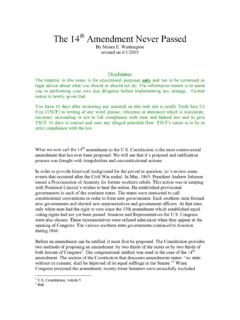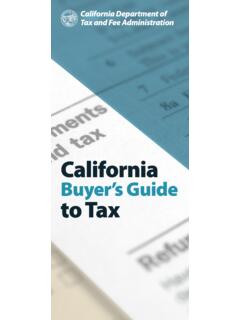Transcription of Income Tax Is Voluntary - Truth Sets Us Free
1 Income Tax Is Voluntary by Moses G. Washington revised on 4/1/2003. Disclaimer The material in this essay is for educational purposes only and not to be construed as legal advice about what you should or should not do. The information herein is to assist you in performing your own due diligence before implementing any strategy. Formal notice is hereby given that: You have 10 days after reviewing any material on this web site to notify Truth Sets Us Free (TSUF) in writing of any word, phrase, reference or statement which is inaccurate, incorrect, misleading or not in full compliance with state and federal law and to give TSUF 30 days to correct and cure any alleged potential flaw. TSUF's intent is to be in strict compliance with the law. In this article, we will explore the evidence that indicates that the vast majority of Americans do not lawfully owe Income taxes.
2 Once you become convinced that you don't owe any Income tax, the next question is how do you un-volunteer. So the article will also address techniques that may allow you to un-volunteer. Authority to Tax We will first discuss the authority of the federal government to tax Americans. The Constitution allows Congress the power to lay and collect two kinds of taxes: direct taxes and indirect taxes. There are two authorities in the constitution delegating this power of direct taxation given to Congress. "Representatives and direct taxes shall be apportioned among the states which may be included within this Union, according to their respective [Article 1, Section 2, Clause 3]. "No capitation, or other direct tax, shall be laid, unless in proportion to the census or enumeration herein before directed to be taken.
3 [Article 1, Section 9, Clause 4]. A direct tax is one levied directly on an individual ( poll tax, capitation tax) or their property ( property taxes). This means a direct tax is a property rights issue because Americans have inalienable rights to their person and their property. Your person or property cannot be federally taxed with a direct tax. This restriction does not apply to the states. So, states can impose a direct tax on your person or your property, property tax. Also note that the inalienable right of property also includes the Income from that property. This means the federal government cannot directly tax the Income from your person or your property. The Constitution says direct taxes must be apportioned among the states . This means to distribute or allocate proportionally (Webster). It means the tax must be divided up equally among the states, based on their population.
4 That is one of the reasons a census is taken every ten years. So, the power to lay a direct tax on the people and/or their property was not delegated to the federal government. In practical terms, this means that the States become the collecting agency for direct taxes for the federal government. If Congress wants to raise 10 million dollars, it divides that amount proportionally among the states, based on their population. The states legislatures would then collect the necessary monies. The States would be required to assess and collect their portion of the direct taxes apportioned to it by Congress and to forward the revenues to the Department of the United States Treasury. Notice that the State must assess the tax. Rendering an assessment of a direct tax is the function of the government, not the taxpayer.
5 To require a citizen to self-assess a direct tax involuntarily (by filling out a Form 1040) is a violation of the 13th Amendment (prohibition against involuntary servitude ). The Supreme Court has ruled that the machinery or instrumentality which ascertains the amount of tax due is the government agency whose action is called an assessment. For direct taxes, if there is no assessment made by the government, there is no liability to pay the tax. Anyone who files a tax return (Form 1040) is assessing himself. They are also declaring, under penalty of perjury, that the information provided on the tax return is true, complete and correct. So filling out a tax return and remitting payment of any amount of revenue is a Voluntary act. Although Congress has the power to levy direct taxes, it has not done so since the Civil War.
6 Some people think the 16th Amendment removed the apportionment feature of direct taxes. This is not true. Even if direct taxes did not have to be apportioned, the tax must still be applied to the states, not to the individual people. This means that all federal taxes currently in effect are in the class of indirect taxes, including the Income tax . An indirect tax is one laid on taxable activities. Some activities are taxable and some are not. This kind of tax is usually passed on to consumers. The authority to levy an indirect tax is also found in the Constitution. The Congress shall have power to lay and collect taxes, duties, imposts and excises to pay the debts and provide for the common defense and general welfare of the United States: But all duties, imposts and excises shall be uniform throughout the United States.
7 [Article 1 Section 8, Clause 1, emphasis added]. First note that indirect taxes must be uniform. This means that all subjects in a taxable category or class will be taxed at the same rate. If the tax on distilling alcohol is 5% of the net Income , then all distilling of alcohol must be taxed at the same rate. Next, notice that this section of Constitution lists three kinds of indirect taxes, including only: excise , duties on imports, or tariff. excise . Tax laid on manufacture, sale or consumption of commodities or upon license to pursue certain occupations or upon corporate privileges. [Black's Law Dictionary, 5th Edition]. This includes, but is not limited to, taxes on products such as cigarettes and liquor. It would also include taxes on corporations. Duties on imports. This term signifies not merely a duty on the act of importation, but a duty on the thing imported.
8 [Black's Law Dictionary, 5th Edition]. Tariff. The list or schedule of articles on which a duty is imposed upon their importation into the United States, with the rates at which they are severally taxed. [Black's Law Dictionary, 5th Edition]. A tax on duties, imposts and excises is not on the person (capitation tax) engaged in an activity, and it is not on the Income (property) received from an activity, but is on the activity itself. And this taxable activity is a privilege' that is granted and regulated by the government. The tax rate is imposed on that activity is determined by the Income produced by that activity. The Income is just a guideline for determining the amount of tax. The tax is not on the Income ! The important distinction for an indirect tax is that it is a tax on an activity, it is on something you do.
9 You can avoid the tax by not engaging in the activity. These three forms of taxation are referred to as Voluntary or privilege taxes because the activity which is taxable is engaged in voluntarily and as a privilege granted by the government. It does not cover activates which are exercised by citizens as a natural, constitutionally secured right. The Income itself is not taxed. It is the activity that produced the Income that is taxed. And that activity is always a taxable privileged activity. For example, a gasoline excise tax in not on the gasoline, it is on the sale of the gasoline. Gasoline is property, not an activity. Property can only be taxed with a direct tax. It is the sale' of the gasoline that is taxable, an activity. The amount of the indirect tax is usually passed on to the consumer as the tax is included in the price of the product.
10 An easy way to remember the distinction between direct and indirect taxes is to correlate them to inalienable rights and privileges. Inalienable rights, exercised by an individual, can only be taxed directly with a capitation (head) tax, or a direct tax apportioned among the states. A capitation tax is on your body, which is your personal property, and is imposed on the state where the people live, not on the people directly. Indirect taxes (duties, imposts and excises) are applied to privileges and they must be taxed uniformly. The tax is not on the people or the property, because these can only be taxed directly, through apportionment. Therefore, the tax is called indirect, because it is on a privileged activity (such as the manufacture of alcohol), but the tax is indirectly passed on to the people buying the alcohol.







